
Top 10 Reasons To Get DevOps Certified
What are the Top 10 Reasons to get a DevOps Certification?
1. Re-invent Your Career.
2. Get noticed in the talent pool of an expanding DevOps Job Market as a DevOps Certified Professional.
3. Increase your Employability and Earning Potential.
4. Get Recognition with more challenging work and lucrative assignments.
5. Enhance your Professional Competency.
6. Get hands-on experience on DevOps tools.
7. Familiarize yourself with Software Development (Dev) and Technology Operations (Ops) lifecycle.
8. Increase your Productivity at work.
9. Get an in-demand and a globally recognized certification.
10. Get DevOps Certified to Recession-proof your Career.
What is DevOps?
DevOps is a methodology at the intersection of Software Development, Technology Operations, and Quality Assurance. This collaboration between software development (Dev) and technology operations (Ops) enables businesses to build, test, iterate and release software faster and in a more efficient manner.
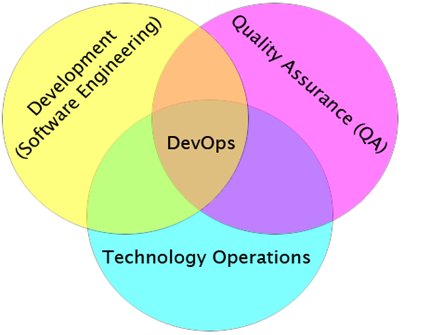
What is DevOps Trying to achieve?
As the speed of software application development increases, so does the demand for eliminating inefficiencies in implementation that cost businesses significantly.
DevOps connects 'Dev' and 'Ops' and tackles the entire ‘Build-Test-Iterate-Release’ like a well-oiled machine having clear roles and responsibilities and well-defined inputs and outputs.
(Source: DevOps - The Future of Application Lifecycle Automation by Capgemini)
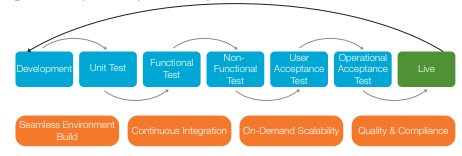
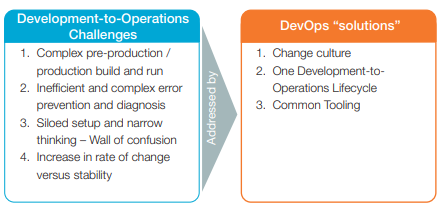
Scope of DevOps Professionals
DevOps Professionals are the facilitators who work with both development and operations teams. DevOps requires continuous interaction by automating the integration and deployment processes resulting in higher productivity.
Did You Know?
According to IDC’s “DevOps and the Cost of Downtime: Fortune 1000 Best Practice Metrics Quantified”
(Source: DevOps - The Future of Application Lifecycle Automation by Capgemini)
- The average hourly cost of an infrastructure failure is $100,000
- The average hourly cost of a critical application failure is $500,000 – $1M
- Unplanned application downtime costs the Fortune 1000 from $1.25 billion to $2.5 billion every year.
What is the Value of DevOps
DevOps enables businesses to increase agility, improve quality, and enhance innovation while reducing outages in production that directly impacts the topline.
(Source: DevOps - The Future of Application Lifecycle Automation by Capgemini)
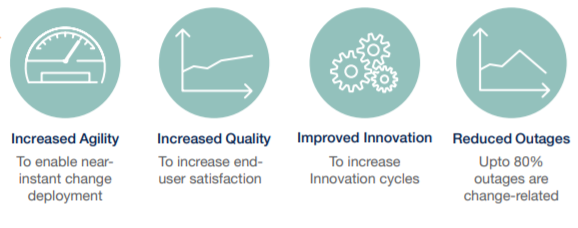
Average Salary of a DevOps Engineer in the United States
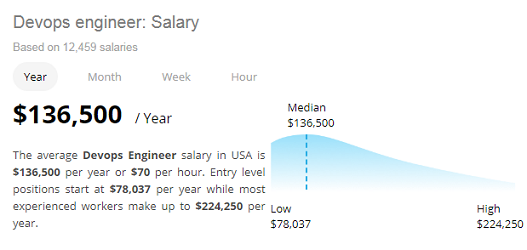
Who can become a DevOps Certified Professional?
According to the DevOps Institute, the target audience for the DevOps Foundation course includes Management, Operations, Developers, QA and Testing professionals such as:
- Individuals involved in IT development
- IT operations or IT service management
- Individuals who require an understanding of DevOps principles
- IT professionals working within, or about to enter, an Agile Service Design Environment
- Automation Architect, Application Developers
- Business Analysts, Managers, Stakeholders
- Change Agents, Consultants
- DevOps Consultants, DevOps Engineers
- Infrastructure Architect
- Integration Specialists
- IT Directors, Managers, Operations, Team Leaders
- Lean Coaches
- Network Administrators, Operations Managers
- Project Managers, Release Engineers
- Software Developers, Software Tester/QA
- System Administrators, Systems Engineers, System Integrators
1. Re-Invent your Career: Certification in DevOps opens greater avenues in the organizations practising DevOps. By understanding the fundamentals and tools of DevOps through certification, you can re-invent your career.
(Source: Google Trends data as of 13th November 2019).
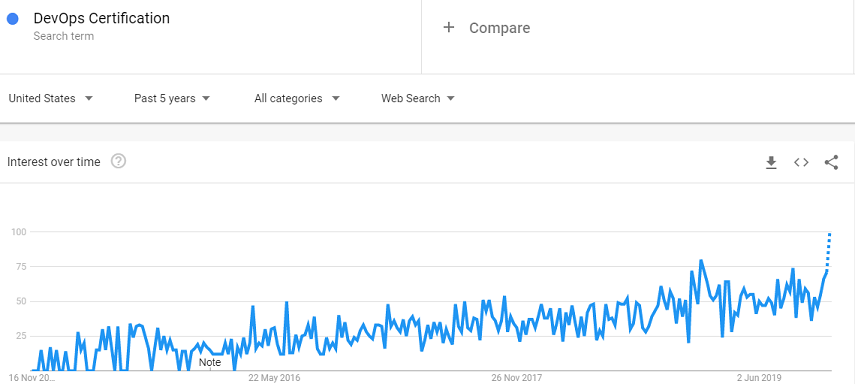

6. Enhance your DevOps tool skills: Certification in DevOps enhance your knowledge of DevOps-oriented technologies and processes required to excel at your workplace as a DevOps professional.
Gain superior knowledge of tools such as:
- Git: Version control system and source code management
- Jenkins: server automation and developing CI/CD pipelines
- Selenium: Automated testing
- Docker: Software containerization
- Kubernetes: Container orchestration
- Puppet: Configuration management
- Chef: Configuration management
- Ansible: configuration management, application deployment, task automation
- Nagios: Continuous monitoring
Read more in The State of DevOps Tools
7. Get Familiar with the Software Development and Technology Operations Lifecycle: As certified DevOps professionals get hands-on experience on all the functioning department such as Source Code Management, Continuous Integration, Continuous Testing, Configuration Management, Containerization, and Continuous Monitoring.
To know more about the functioning departments of Software Development and Technology Operations life cycle, visit iCert Global.
8. Higher Productivity: According to the Developer.com, DevOps results in a 51 per cent increase in employee productivity.
DevOps certified professionals are familiar with infrastructure, configuration and also perform tests and debug software.
9. Get an in-demand and globally recognized certification:
- According to the Robert Half Technology Salary Guide for 2019, DevOps professionals continue to be in demand, with DevOps engineer remaining one of the hardest to staff positions in technology companies.
- According to the DevOps Institute’s "Upskilling: Enterprise DevOps Skills Report 2019,” 39 percent of respondents around the globe were recruiting for the DevOps Engineer/Manager title.
Google Trends Data for DevOps Certification searches in the United States and India over the past five years.

This course will help you develop the expertise about continuous development and deployment, automation, and DevOps tools like Git, Docker, Jenkins, Puppet and Nagios. DevOps as a career holds great potential and professionals with this certification command an attractive compensation package.
Comments (0)
Write a Comment
Your email address will not be published. Required fields are marked (*)


















.webp)






 (1).webp)
